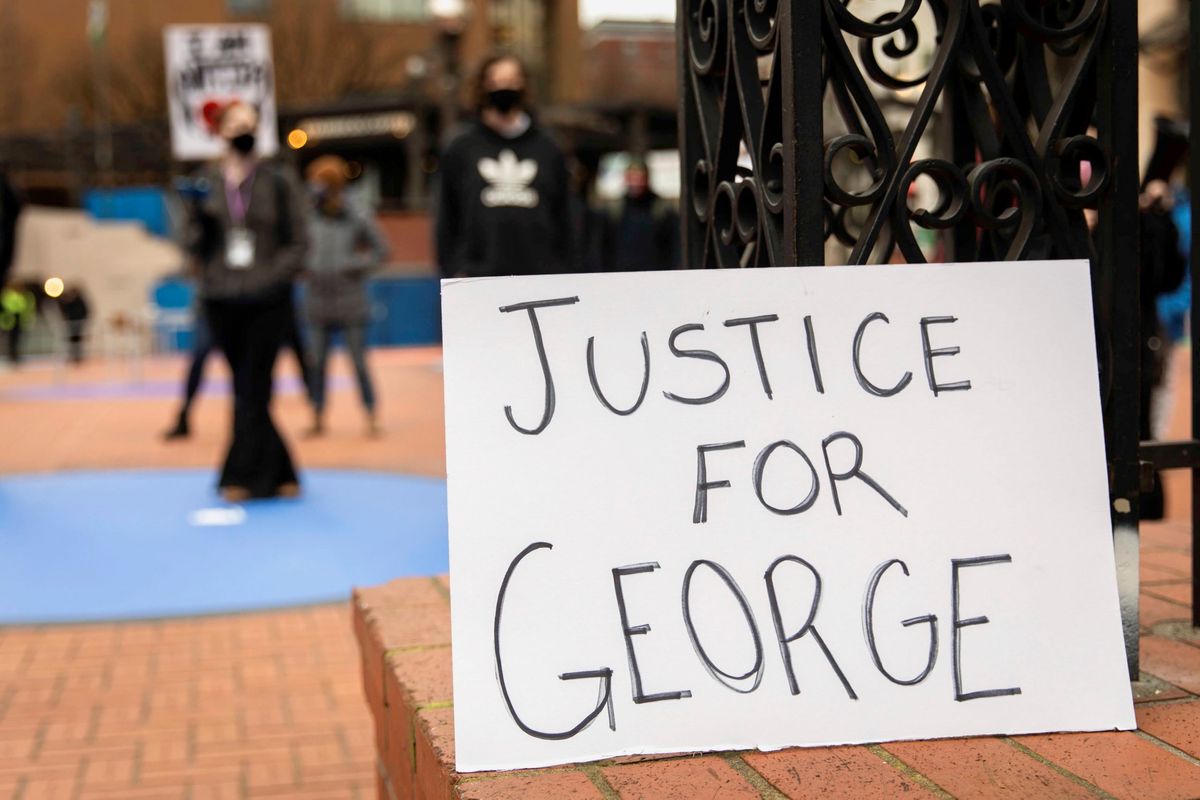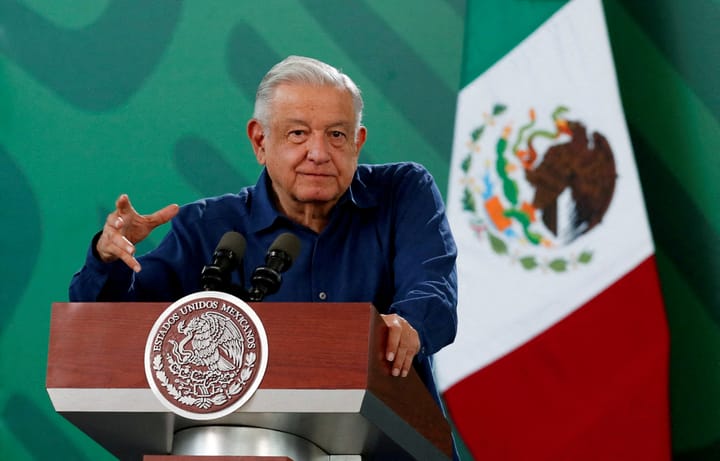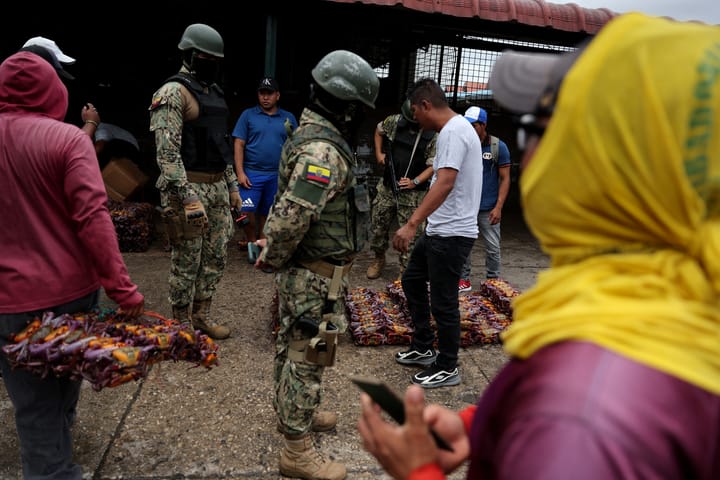Derek Chauvin is found guilty of murdering George Floyd
Chauvin was charged with second-degree murder, third-degree murder and second-degree manslaughter for his role in the death of George Floyd in Minneapolis, Minnesota on May 25, 2020.

A few minutes every morning is all you need.
Stay up to date on the world's Headlines and Human Stories. It's fun, it's factual, it's fluff-free.
On Tuesday, April 20, after a day of deliberations, the jury in the trial of former police officer Derek Chauvin reached a verdict of guilty for all charges.
Chauvin was charged with second-degree murder, third-degree murder and second-degree manslaughter for his role in the death of George Floyd in Minneapolis, Minnesota on May 25, 2020. Chauvin was remanded into custody until his sentencing hearing. He could face up to 40 years in prison.
At the time of Floyd’s death, Chauvin was recorded with his knee on Floyd’s neck while attempting to make an arrest. The video, which quickly spread online, showed Floyd begging to be let up off the ground and repeatedly insisting that he couldn’t breathe. Following Floyd’s death, Chauvin was arrested and charged with second-degree murder last June.
The death of Floyd, who is Black, led to worldwide protests and, in some cities, riots and police clashes. The Black Lives Matter protests lasted throughout the summer, even as the COVID-19 pandemic erupted across the country, and have continued into 2021. There have been multiple days of protests and rallies in Minneapolis throughout Chauvin’s trial, which began in early March.
During Chauvin’s trial, a police officer killed another Black man, Daunte Wright, just miles away in a suburb of Minneapolis. Like Floyd’s death, the killing of Wright has ignited anger and led to calls for the officer to be arrested for murder. It is against this backdrop that Minneapolis uneasily awaited the verdict in the Chauvin trial, which, no matter the outcome, was sure to be controversial.
The National Guard has been deployed in and around Minneapolis since Wright’s death and remained in place in preparation for the jury’s decision.
The trial is being overseen by Hennepin County Judge Peter Cahill. Due to the ongoing pandemic, Cahill has allowed the trial to be fully televised and livestreamed, an unusual practice in the state of Minneapolis.
The prosecution’s case in the Chauvin trial
Following multiple days of jury selection and other pretrial procedures, the prosecution began presenting its case against Chauvin on March 29. In total, the prosecution, which was led by Minnesota Attorney General Keith Ellison, took 11 days to present their case, which included 38 witnesses and multiple video clips from the day of Floyd’s death.
The core of the prosecution’s case was that Floyd died as a direct result of Chauvin’s actions during the attempted arrest, specifically the improper use of his knee to hold Floyd down. Prosecutors sought to prove that Chauvin’s actions were inappropriate and excessive.
To that end, among the witnesses called were Minneapolis Police Chief Medaria Arradondo, who stated the restraint used by Chauvin violated the department’s policy. Two other ranking officers with the department, Lieutenants Richard Zimmerman and Johnny Mercil, further testified that the knee-on-neck restraint should not have been used.
The prosecution also called on emergency medical technicians to testify that Chauvin also failed to provide the proper medical treatment to a person who was struggling to breathe, whatever the cause. As a police officer, it was Chauvin’s responsibility to administer lifesaving medical care when it was clear Floyd was in distress.
Other witnesses included members of Floyd’s family and witnesses who had been at the scene at the time of Floyd’s death. At times, the testimony was emotional, even heated, with some witnesses sparring with the defense attorney who was cross-examining them. In all, the witness and family testimony aimed to paint Floyd as a victim of police overreach.
The defense’s case in the Chauvin trial
In comparison to the prosecution’s case, the defense provided a much shorter argument in favor of Chauvin’s innocence. The defense’s case lasted only two days and involved calling seven witnesses. Chauvin’s defense was led by defense attorney Eric Nelson, whose focus in the trial was raising doubts about the narrative and timeline around Floyd’s death.
Key to the defense’s argument was that Floyd died due to his poor health and his use of drugs. Fentanyl and methamphetamine were found in Floyd’s system during an autopsy. In a cross-examination of one of the prosecution’s witnesses, Hennepin County medical examiner Dr. Andrew Baker, Nelson got Baker to state Floyd’s health and drug use were contributing factors in his death.
Baker’s testimony is at the heart of the defense’s case that it was not asphyxiation that killed Floyd, but the stress of the moment, made worse by a generally unhealthy lifestyle. While the prosecution brought in other health experts to argue that asphyxiation due to an improper chokehold was the root cause of death, Baker, as the official who conducted the original autopsy, was a key witness.
The defense also sought to undermine the argument that Chauvin’s chokehold was inappropriate by calling on Barry Brodd, a former police officer and veteran trainer of restraint holds. Brodd called Chauvin’s hold “justified” and said that the involved officers had acted appropriately for the situation, both because of Floyd’s drug use and because of the risk presented by the surrounding crowd.
Chauvin did not testify in his trial.
Closing arguments
Following the conclusion of witness testimony, each side presented their closing arguments before the jury was sent off to deliberate. The closing arguments, presented on April 19, largely rehashed the cases that the respective sides made throughout the trial, but they also included at-times emotional appeals to the jury.
One major aspect of the defense that Nelson emphasized in his closing arguments was that the video evidence was flawed, even “biased.” He argued that what was recorded, including in the viral video that spread shortly after Floyd’s death in May 2020, did not show everything and, to a layperson, could not reveal how the situation would have appeared to “a reasonable police officer.”
Nelson argued that the prosecution had not proven “beyond reasonable doubt” that Chauvin was responsible for the death of Floyd. In making their determinations, Nelson urged the jury to put everything they had heard during the trial “into the context of the totality of the circumstances.”
The prosecution’s closing arguments again emphasized the inappropriateness of Chauvin’s actions and sought to paint the former police officer as someone who acted with indifference to Floyd. One of the defense attorneys, Jerry Blackwell, stated, “You were told … that Mr. Floyd died because his heart was too big … the reason George Floyd is dead is because Mr. Chauvin’s heart is too small.”
Going into deliberations, the jury was instructed by Judge Cahill to “not let bias, prejudice, passion, sympathy or public opinion influence your decision.” The jury was sequestered until their decision was made, which means they were completely isolated in an undisclosed location.
Have a tip or story? Get in touch with our reporters at tips@themilsource.com




Comments ()